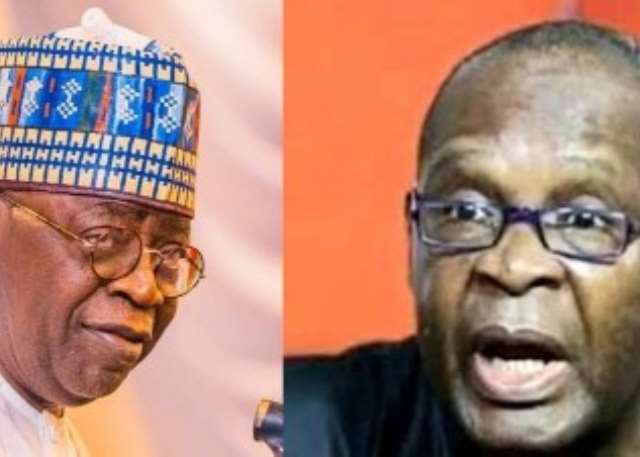Some of President Bola Tinubu’s fiercest critics have transformed into his passionate defenders and spokespersons, highlighting the complex nature of political allegiances in Africa’s largest democracy. This dramatic shift in loyalty among prominent political figures has sparked intense debate about political consistency and principles in Nigerian politics.
The most recent and notable conversion is Daniel Bwala, whose appointment as Special Adviser to the President on Policy Communication sent shockwaves through Nigeria’s political sphere. As a former spokesperson for the People’s Democratic Party’s 2023 Presidential Campaign, Bwala had established himself as one of Tinubu’s most vocal critics, consistently launching scathing attacks against both the president and the All Progressives Congress (APC).
Bwla’s criticism of Tinubu was particularly pointed during and after the 2023 presidential election. In a memorable appearance on Channels TV in December 2023, he boldly declared that “Nothing will work under President Tinubu, even if he is given 30 years.” His social media presence was equally combative, regularly questioning Tinubu’s competence and the APC’s governance record. In one particularly sharp critique on X (formerly Twitter), he wrote, “The human brain is unique and miraculous. It works and functions optimally 24 hours a day and 365 days a year until you join the APC. Then it stops working.”
However, January 2024 marked a dramatic turning point in Bwala’s political trajectory. Following a visit to the State House in Abuja and a subsequent meeting with Tinubu in Paris, his rhetoric underwent a complete transformation. The former critic began praising the president’s “passion to lead Nigeria out of the woods,” culminating in his acceptance of a presidential advisory role.
Another fascinating conversion story is that of Doyin Okupe, the septuagenarian political veteran once known as the “attack dog” of Nigerian politics. As a former Senior Special Assistant to President Goodluck Jonathan, Okupe had frequently clashed with Tinubu, often questioning his integrity and political relevance. Yet, in a surprising turn of events, he has emerged as one of Tinubu’s strongest defenders, despite having served as the Director-General of Peter Obi’s Presidential Campaign Organisation.
Reno Omokri’s transformation from critic to supporter provides another compelling example of this political metamorphosis. As a former Special Assistant to President Goodluck Jonathan on New Media, Omokri had maintained a relentless social media campaign against Tinubu, questioning everything from his educational credentials to his political integrity. His posts on X were particularly caustic, often focusing on controversial aspects of Tinubu’s past. However, following the 2023 presidential election, Omokri’s stance shifted dramatically, leading him to describe Tinubu as “the master of the game” and publicly pray for his success.
Perhaps the most dramatic conversion is that of Femi Fani-Kayode, the former Minister of Culture and Tourism. Known for his eloquent but often harsh criticism, Fani-Kayode had once declared he would “rather die” than join the APC. His attacks on Tinubu were particularly personal, including allegations about the president’s health and character. Yet, in September 2021, he not only joined the APC but also became Director of the New Media sub-committee of the party’s Presidential Campaign Council, attributing his change of heart to “the Spirit of God.
These political transformations have sparked significant debate about the nature of political conviction in Nigeria. Omoyele Sowore, the 2023 presidential candidate of the African Action Congress, has dismissed such switches as evidence of a lack of political discipline, stating, “These are not people who are principled in their dealings, ever!
Professor Chris Nwaokobia, Convener of CountryFirst Movement, offers a more critical perspective, suggesting that these transformations reflect a fundamental crisis of values in Nigerian politics. According to him, these switches demonstrate how some politicians prioritize personal gain over political principles, willing to “live for anything that gives them money and to die for nothing.
The phenomenon of political conversion in Nigeria raises important questions about the nature of opposition politics and the role of criticism in democratic discourse. While some view these transformations as pragmatic political maneuvering, others see them as symptomatic of deeper issues within Nigeria’s political culture, where principles appear subordinate to personal advancement.
These dramatic shifts in political allegiance also highlight the complex nature of power dynamics in Nigerian politics, where today’s opposition figure could become tomorrow’s staunch defender of the government. This fluidity, while potentially undermining political discourse, also reveals the adaptive nature of Nigerian political actors and the complex web of relationships that define the country’s political landscape.
As Nigeria continues to develop its democratic institutions, the phenomenon of political conversion remains a significant feature of its political landscape, prompting ongoing debates about the nature of political conviction, the role of opposition, and the balance between principle and pragmatism in public service. The transformation of Tinubu’s critics into supporters serves as a compelling reminder of the dynamic and often unpredictable nature of Nigerian politics, where today’s fiercest critic might well become tomorrow’s most ardent defender.



